Datuk Seri Najib Tun Razak warned Malaysians to be wary of “dream merchants” who could turn the country into another failed state depending on foreign handouts to survive.
The Prime Minister said the Government does not want to see the country, some day, having to hang on to the goodwill of international financial institutions, similar to the fate that had befallen some nations forced to seek handouts.
EDITORS NOTE
Let’s stop blaming. The blame games are uncertain, botch-ups still more, and the ones involved, a much greater part of the populace, that soon one realizes the old phrase that with one finger pointing outwards, three point towards you.
Devilish advocacy is.
The term “Devil’s Advocate” comes from a practice of the church, where, whenever someone was to be “canonized” or “beatified”, there would be a canon lawyer, who would argue every act claimed to be a “miracle” or “godly”. This was to ensure that there were not too many saints to accommodate in the scriptures, spreading confusion further. For instance, if “Berlusconi” was to be upgraded, Col Gaddafi would be his advocate. Pardon my trespasses, but His Holiness the highest pontiff may be “canonized” if he still has it in him to pardon both.Crime is no longer a sin or a deterrence for peace of the soul.
The problem is: We have voted into power the stupidest bunch of thieves. They are such losers that they can’t steal a hamburger without leaving ketchup stains all over. Yet they are constantly trying to pull off the biggest scams in history.Call it circumstances, call it an inability to discern. The line between routine and regular, legal and illegal, crime and indecent behaviour is missing at many places. Like an unmanned railway crossing, or a street crossing without lights or a traffic constable. You got to settle it on your own. There is no argument whether he was on the wrong side. By that time you may be pulled out of the car, and in a suburban area, may be punched. Police inaction is the prescription for a peaceful society. There is no one who would stand as witness, and if he does, just wait till he turns hostile.Japan’s tragic tsunami teaches us one great lesson. Almost all the buildings withstood magnitude 9. The loss was mainly due to fire and floods and not due to crashing skyscrapers. The nuclear part could not be foreseen, and is a matter to be addressed for future safety that concerns all nations. The little tsunami we had here was regarding the government’s pro-nuclear stand. The opposition couldn’t say much, because WikiLeaks has a similar recording for both sides. Great job WikiLeaks! Now there is a debate whether the source of the leak is authentic or not. I thought that was always the case, if you knew what exactly is the line of truth!
this Government. It’s neck deep in its own sticky sleaze. What’s worse, you haven’t seen anything yet. All these scams are but the tip of the iceberg. Talk to anyone and you will get an instant dhobi list of scams in queue to break. No, I am not saying this.UMNO leaders are, in private. Look at Najib, wan and waylost MuhyiddinYassin going apopleptic in faux anger because he has to defend what he knows is indefensible. They look less convincing than IBRAHIM KATAK playing Joan of Arc. Our leaders are making deals on the sly with greedy builders, land sharks, illegal mining companies, corporate fixers, shady arms dealers and, O yes,
Najib has no balls to demand Sarawak Chief Minister Tan Sri Abdul Taib Mahmud ‘exit “You can’t try to force him as he knows how to turn the tables on you, as he had done in the past. Some political hopefuls tried to force him out but in the end, they ended up in political oblivion.”with his 29 Member of Parliament najib will have face altuntuya ghost Weakness is contagious. It tends to debilitate even those limbs of the body politic that are functioning normally barian minister have always known that they owe their jobs to party president. not to their voters , but they showed the requisite deference to the PM during his visit would be an asset on judgment day when the voter headed for the ballot box. This enormous strength has withered because no one expects najib to win in the next general elections.NAJIB admitted privatelyInstead, Power is never stagnant. It either consolidates around the leader, or ebbs. Those with longer plans for the future than the Prime Minister are establishing individual markers at the cost of collective cohesionreadmorehttp://malaysiakita786.blogspot.com/2011/03/sarawak-chief-minister-tan-sri-abdul.html
ROSMA who want to manipulate our political choices. And, what’s more amazing, they do it like bungling idiots. Even Inspector Clouseau can outwit them.But that doesn’t mean they are not malevolent. These are people who are destroying Malaysia from within.
They are not just robbing you, me, and the exchequer. They are destroying institutions, subverting laws, vandalising our heritage and history, and trying to build a dazzling, a moral edifice of crime and corruption unprecedented in the nation’s history. It’s a scary scenario that could turn the land of the Mahatma into one gigantic Gotham City with a flyover to hell.But my question is more basic: Can we trust these idiots to run this great nation?
Najib has no balls to demand Sarawak Chief Minister Tan Sri Abdul Taib Mahmud ‘exit “You can’t try to force him as he knows how to turn the tables on you, as he had done in the past. Some political hopefuls tried to force him out but in the end, they ended up in political oblivion.”with his 29 Member of Parliament najib will have face altuntuya ghost Weakness is contagious. It tends to debilitate even those limbs of the body politic that are functioning normally barian minister have always known that they owe their jobs to party president. not to their voters , but they showed the requisite deference to the PM during his visit would be an asset on judgment day when the voter headed for the ballot box. This enormous strength has withered because no one expects najib to win in the next general elections.NAJIB admitted privatelyInstead, Power is never stagnant. It either consolidates around the leader, or ebbs. Those with longer plans for the future than the Prime Minister are establishing individual markers at the cost of collective cohesionreadmorehttp://malaysiakita786.blogspot.com/2011/03/sarawak-chief-minister-tan-sri-abdul.html
“We will not let Malaysia transform from a modern middle-high income industrial nation into a failed state due to fiscal irresponsibility and mismanagement.
“A responsible (political) party would rather remain unpopular in the short term than drive the country bankrupt in the long run,” he said when addressing civil servants here Tuesday.
“It is normal for some people to be mesmerised by cunning dream merchants who utter sweet nothings to fool them through promises in documents of various forms, like sea blue, dark green, white and now orange,” said Najib.
However, he warned, that Malaysia might suffer the fate of other failed states if the reforms proposed by certain political parties were allowed to take place.
In an obvious reference to the political agenda outlined in the Buku Jingga (Orange Book) of the Pakatan Rakyat parties, Najib said the “dream merchants” have, at times, managed to dupe people into believing “there’s gold at the end of the rainbow.”
The prime minister, who is Barisan Nasional chief, said that when it came to promises, the ruling coalition was able to deliver them through various initiatives and capabilities within its means.
“In fact, even before we make the promises, we ensure that whatever is said is realistic,” adding that the Government would be responsible and take into account every aspect of the people’s well-being and long term interests.
He said it was irresponsible for any party to introduce initiatives that were only populist in nature, without explaining to the people the actual cost of the plans and methods of financing the initiatives.
“Simply saying these plans will be funded by plugging leakages in government spending does not present a transparent explanation.
RELATED ARTICLE NAJIB: I Cheat, Therefore I Am (a Patriot) A Dramatic Story Three Little Pigs Retelling relatedarticle Ummi Hafilda lost her locus standi when the prosecution never called her to testify in court to rebut the prostitute allegation RELATED ARTICLE Najib said truth and justice could be achieved if doubts were removed.You take Najib out of … Read more THE GRAND SAINT OF IMMORAL AUTHORITY NAJIB LOST THE ‘MORAL AUTHORITY AND LEGITIMACY’ TO LEAD THE GOVERNMENT
The global economic crisis taught us to question our most cherished beliefs about the way we conduct macroeconomic policy. Earlier I had put forward some ideas to help guide conversations as we reexamine these beliefs. I was heartened by the wide online debate and the excellent discussions at a conference on post-crisis macroeconomic policy here in Washington last week. At the end of the conference, I organized my concluding thoughts around nine points. Let me go through them and see whether you agree or not.
1. We’ve entered a brave new world in the wake of the crisis; a very different world in terms of policy making and we just have to accept it.
2. In the age-old discussion of the relative roles of markets and the state, the pendulum has swung–at least a bit–toward the state.
3. The crisis made it clear that there are many distortions relevant for macroeconomics, many more than we thought earlier. We had ignored them, thinking they were the province of the micro-economist. As we integrate finance into macroeconomics, we’re discovering distortions within finance are macro-relevant. Agency theory–about incentives and behavior of entities or “agents”–is needed to explain how financial institutions work or do not work and how decisions are taken. Regulation and agency theory applied to regulators is important. Behavioral economics and its cousin, behavioral finance, are central as well.
4. Macroeconomic policy has many targets and many instruments (that is, the tools we use or variables to implement policy). There are many examples of this that were discussed at the conference, but here are two.
- Monetary policy has to go beyond inflation stability, adding output and financial stability to the list of targets, and adding macro-prudential measures to the list of instruments.
- Fiscal policy is more than just “G minus T” and an associated “multiplier” (the proportion or factor by which changes in government spending or taxes affect other parts of the economy). There are potentially dozens of instruments, each with their own dynamic effects that depend on the state of the economy and other policies. Bob Solow made the point that reducing discussions about fiscal policy to what is the right multiplier does not do service to the issue.
5. We may have many policy instruments, but we are not sure how to use them. In many cases, we are uncertain about what they are, how they should be used, and whether or not they will work. Again, many examples came up during the conference.
- We don’t quite know what liquidity is, so a liquidity ratio is one more step into the unknown.
- It was clear that some people believe capital controls work and some don’t.
- Paul Romer made the point that, if you adopt a set of financial regulations and keep them unchanged, the markets will find a way around, and ten years later, you’ll have a financial crisis.
- Mike Spence talked about the relative roles of self-regulation and regulation. Both are needed, but how we combine them is extremely unclear.
6. While these instruments are potentially useful, their use raises a number of political economy issues.
- Some instruments are politically hard to use. Take cross border flows. Putting in place a multilateral regulatory structure will be very difficult. Even at the domestic level, some macro-prudential tools work by targeting specific sectors, sets of individuals, or firms, and may lead to strong political backlash by those groups.
- Instruments can be misused. The more there are, the more the scope for misuse. It was clear from the discussion that a number of people think that, while there may be an economic case for capital controls, governments could use them instead of choosing the right macroeconomic policies. Dani Rodrik argued for using industrial policy to increase the production of tradables–goods or services that can be traded among countries–without getting a current account surplus. But in practice we know the limits of industrial policy, and they haven’t gone away.
7. Where do we go from here? In terms of research, the future is exciting. There many topics on which we should work–namely macro issues with, as Joe Stiglitz said, the right micro foundations.
8. Things are harder on the policy front. Given we don’t quite know how to use the new tools and they can be misused, how should policymakers proceed? While we have a good sense of where we want to get to, a step-by-step approach is the way to do it.
- Take inflation targeting. We can’t, from one day to the next, just give it up and have, say, a system with five targets and seven instruments. We don’t know how to do it and it would be unwise. We can, however, introduce gradually some macro-prudential tools, testing the water to see how they work.
- Increasing the role of Special Drawing Rights in the international monetary system is another example. If we go in that direction, we can move slowly from, say, creating a market in private SDR bonds to exploring the possibility for the IMF to issue SDR bonds to the private sector and then, if feasible, issuing them to mobilize funds in times of systemic crisis.
Pragmatism is of the essence. This was a general theme that came up, for example, inAndrew Sheng’sdiscussion of the adaptive Chinese growth model. We have to try things carefully and see how they work.
9. We have to keep our hopes in check. There are going to be new crises that we have not anticipated. And, despite our best efforts, we could have old-type crises again. That was a theme in Adair Turner’s discussion of credit cycles. Can we, using agency theory and the right regulations, get rid of credit cycles? Or is it basic human nature that, no matter what we do, they will come back in some form?
I was asked whether the conference was “Washington Consensus 2“. It was not intended to be and it was not. The conference was the beginning of a conversation, the beginning of an exploration, and we look forward to your contributions.“It does not give a clear picture of the government’s need to increase revenue and avoid being dependent on natural resources,” he said, adding it was not the time for the people to try and experiment but to continue to hold on tight to what has been tested and proven.
Najib said this was why the Government implemented policy to rationalise subsidies even though, in principle, it believed that subsidies were vital for certain groups and sectors.
“We have to understand that Government resources are limited while the nature of demand is unlimited.
MCA CHINESE SURVIVES BASHING ISLAM WHILEUMNO MALAYS NEED BASH UP CHRISTAINS TO SURVIVE SO ITS ALL THE GAME OF SURVIVAL

Nafees Syed
I felt like I was in a fishbowl last Thursday. The halls of the House of Representatives office buildings were teeming with visitors for the King hearings. With my headscarf, I was obviously Muslim, and with my Blackberry and fast walk, a Congressional staffer. When someone asked me, as many others had done, if I had attended the King hearings, I shrugged and answered, “I had more important things to do,” and we laughed. But my real answer was that I didn’t want to give King or his witnesses, known Islamophobes, the attention that they undoubtedly wanted and didn’t deserve. The only real expert witness was the one who was brought in by the Democrats — law enforcement expert Sheriff Lee Baca. To me, Rep. Peter King had lost his credibility far before he began saying anything about Muslims. That a chairman of the House Homeland Security Committee was and is a staunch supporter of the Provisional Irish Republican Army (IRA), a terrorist organization that has killed hundreds of civilians, astounds me. So when Peter King announced these bigoted hearings for homeland security, after years of voicing outlandish comments about Muslims, I wasn’t surprised. Prejudice by any other name — even national security — smells just as awful. It wasn’t until I realized it was impossible to work on the Hill without watching the King hearing that I reluctantly saw it. And I was moved. Even people who saw the hearings to try to confirm their own biases could not leave without seeing the absurdities exposed, one by one. Rep. Keith Ellison’s heart-wrenching testimony of a Muslim-American who died rescuing others during the 9/11 terror attacks, assumed to be a radical because of his faith until proven innocent by his remains, moved him, me and many others to tears. It was as if every tear represented a spiteful comment, a nasty look, things we Muslims in America have grown to expect. The unwarranted suspicion that hurt Hamdani’s family epitomizes the accusations that cloak us even today, something that underlies the foundations of this hearing. Rep. Sheila Jackson Lee highlighted this when she upheld the right of Muslims to practice their faith in America — opposed to King’s offensive remarks about mosques and the recent anti-Islamic laws circulating in Oklahoma, Tennessee and Texas legislatures. With prosecutorial grace, she left Rep. King floundering: “I am overwhelmed by this hearing and the lack of factual basis for it,” she said after deftly proving how Muslims were cooperative with law enforcement using the very witnesses who were called in to prove otherwise. More importantly, she showed how the hearings dangerously ignored important issues in homeland security in its obsession with Muslims. All of the Democratic members of the House Homeland Security Committee played a role in undermining the McCarthyesque hearing, which highlights one of the most positive consequences of the hearings: it has led to a unified Democratic stance against this witch-hunt of Muslim-Americans.
PERSONALITIES FROM MARGEEMAR HAVE BEEN BASHING ISLAM,NOW MCA PORNSTAR PRESIDENT CHUA SOI LEK
Chua has no right to belittle (anyone) and act in a condescending manner towards other people’s culture and religious practices.’
Chua must apologise, say Muslim lawyers NGO
I fully support and empathise with Muslim Lawyers Association president Zainul Rijal Abu Bakar’s call for an apology from MCA chief Dr Chua Soi Lek.
I fully support and empathise with Muslim Lawyers Association president Zainul Rijal Abu Bakar’s call for an apology from MCA chief Dr Chua Soi Lek.
Chua has no right to belittle anyone and act in a condescending manner towards other people’s culture and religious practices. He should issue an unqualified public apology.
PAS candidate Normala Sudirman’s worth as a representative is not decided by what she wears nor her religious beliefs. For Muslims and many Asian women, it is culturally inappropriate to have physical contact with males.
Gandhi, when he was a student in England, explained his vegetarian diet with this remark: “We have to respect those beliefs just as we want others to respect our beliefs.”
Just as I understand the hurt by Muslims over this issue, I hope others too can understand why Indians are hurt over the condescending and derogative and superficial way that the novel ‘Interlok’ has described the Indian caste system. Hindus too, being human, have feelings.
When the DAP representative Teo Nie Ching was invited to a mosque to give a speech, her attire was made into a big issue. A certain BM-language daily really condemned her for a lengthy period. Abdullah Ahmad Badawi also condemned her roundly. Later she got into trouble again for supposedly wearing sports attire which was deemed inappropriate during aerobics with some mosque-goers. Again, Abdullah and the national daily condemned her.
Here Chua is wilfully belittling a respected Malay/Muslim custom with impunity and only Zainul Rijal raises the matter, and that, too, after so many days. Where is Abdullah and the national daily?
Chua, campaign all you want but don’t touch on people’s cultural and religious practises. Normala is a married Malay/Muslim woman, and we have to respect her cultural beliefs. She must be judged by her performance as a people’s representative if she wins, not by her attire or religious/cultural beliefs. Chua should apologise.
The intense levels of Islamic hatred emanating from this country. I have been writing about this for years at my own site. The Gaza ‘aid’ flotilla, which happened in 2010, not 2009, got an enormous amount of press here in the government-run media here in Malaysia…media that is licensed and in truth essentially owned by the Malaysian government. They took the opportunity to demonise Israel and laud the jihadists on the flotilla itself at every opportunity. The nine Malaysians who themselves were onboard the flotilla, and are lionised as national heroes, were greeted upon their arrival here in KL by no less than the Malaysian Prime Minister himself (Najib).
HOW ABOUT THIS
HINDU FUNDAMENTALISM BASTARDS AT MARGEEMAR ON THE RISE IN CYBERSPACE FUNDED BY RSS
div> Gujarat explodes in anti-Modi frenzy. Things are not good in Gujarat and its capital of commerce Ahmedabad and Banglore. A few years ago Narendra Modi orchestrated a vile pogrom of bigotry against the Muslims. More than 3000 Muslims were systematically targeted and massacred. More than 400,000 were thrown out the state. They still yearn … Read more
Najib’s country, his government, clerics, media and educational arms clamor and shriek for another holocaust, for the wholesale removal if not slaughter of Jews. And the kufr, dhimmified world turns a deaf ear and a blind eye.
Malaysia, lest we forget, is also the home of some of Southeast Asia’s most dangerous and lethal terrorists, such as Noordin Top and Azahari Husin. These men who both at one time taught at government-run universities were behind the Bali bombings and a number of other deadly attacks on infidels in Indonesia. After these monsters finally reached room temperature, the bodies were shipped to their homeland of Malaysia for a hero’s sendoff before huge fawning crowds, their Malaysian families intensely proud of their relative’s deeds.
Malaysian muslims has been suppressing and discriminating minority, ethnic chinese and indian, since the independence of Malaysia. I am glad to know that americans are getting to know the true colour of malaysian muslims who are mostly ethnic malay. Muslims are the cancer of the world. Those malaysian muslim leaders are taliban in suit. So, don’t be fooled by their appearances.
Did Obama take any of this into consideration before declaring Malaysia to be a great ‘friend, ally and partner’ of his country the United States?
Democratic Whip Steny Hoyer stated about the hearing: “We all need to work together to keep our nation and Americans safe, and we need everyone’s cooperation to do so. Targeting one segment of our population is not helpful to that objective.” I remember a few years ago feeling like the nerd at the dodgeball game. Neither team wanted anything to do with the Muslim voters, and one team was actively bullying us. Now, as Michael Cohen of the American Security Project argues, “as the U.S. grows more diverse, the King hearings and GOP attacks on Muslims look not only like bad policy but even worse politics.” In complete contrast, elements of our society are engaging Muslims. Earlier this month, the State Department invited me and other contributors to a book of essays by Muslim women, I Speak for Myself, to Farah Pandith’s wisdom session, giving a platform to a group of people often talked about but rarely heard from. White Cloud Press, the publisher of the book, is offering discounts on its Islam-related books to help Americans better understand Muslims, Islam and the Quran. People are taking action even by saying, “Hey, it’s not OK to say that,” when someone cracks an anti-Muslim joke. Their actions recognize something that we upheld as a country 224 years ago. Our founding fathers appreciated the fact that the first country to recognize America’s independence was a Muslim country, Morocco. A few years later, we signed a treaty with Tripoli, again during the holy month of Ramadan, asserting, “The government of the United States of America has in itself no character of enmity against the laws, religion or tranquility of Muslims.” With Rep. King’s hearings, we found forces trying to move us centuries backwards. But although cliché, a simple phone call or a letter to your Congressman really can make sure that the House Homeland Security Committee, which exists to protect us, actually does its job. That such a hearing is occurring in the halls of a democratic U.S. Congress is both a tragedy and a farce. Let’s make sure that such a drama doesn’t occur again.
The recently held Congressional hearing about Muslims in America returns us to the question of whether “Islam is peace,” as President George W. Bush put it on September 17, 2001, or a religion that promotes hate and violence, as its critics allege. Both are wrong. Islam — like all other religions — can be read both ways.
Muslims seeking to justify the use of force quote verses in the Quran such as, “Slay the idolaters wheresoever you find them”‘ (9:5). And they can cite the Hadith, the sayings of the Prophet, stating, “I have been commanded to fight against people so long as they do not declare that there is no god but Allah” (Muslim 1.9.30). At the same time, the champions of peace can quote the Quran itself, which states, “There is no compulsion in matter of faith” (2:256) and “No human can force a change of heart over which God alone has control” (10:99-100).
For some, jihad is interpreted as a “holy war” to subdue the non-believers; for others — a spiritual struggle for moral self-improvement.
Most revealingly, similar texts, open to both kinds of readings, are found in other religions. On the one hand, Christians draw on passages from the New Testament, which portray Jesus as a wrathful conqueror striking down sinners with his sword and ruling with an iron rod (Revelation 19:15); while on the other, they can quote Matthew to “Turn the other cheek” (Matthew 5:38-39) and “Put your sword back in its place” (Matthew 26:52).
Jews can read the Old Testament as condoning violence. For instance, “As for the towns of these people that the Lord your God is giving you as an inheritance, you must not let anything that breathes remain alive. You must annihilate them,” (Deuteronomy 20:16-18). And even revenge, as in “An eye for an eye.” However, through the ages, rabbis have interpreted the same passage as referring merely to monetary compensation. And Jews have invoked pacifistic passages, such as “Nation shall not lift sword against nation, neither shall they learn war anymore.” (Isaiah 2:4; c.f. Micah 4:3)
I could go on and on. However, two observations seem incontestable. Those who seek to point to Islam as a religion that promotes violence should take note: It can be just as readily quoted to support nonviolence. And, in this way, it is not different from other major religions. It is up to the believers which interpretation they follow. However, condemning their faith as inherently violent cannot be justified.
Hence, to the extent that the Congressional hearings are focused on finding out which interpretation of Islam is gaining ground among our Muslim fellow citizens, it is a legitimate pursuit. So is to call on Muslim leaders and Mullahs who embrace the nonviolent version of Islam — and to urge all religious mavens to follow the same course.
Rep. Peter King’s hearings about the “radicalization” of the American Muslim community was just the first in a series of similar inquiries. Moving forward, I hope King takes to heart the sincere and fair-minded critique of his inflammatory rhetoric and sweeping generalization about the Muslim community. Controversial topics and contentious debates need not be avoided, but we need to engage them with substance rather than bluster.
I was proud to stand with diverse faith leaders, national security experts and civil rights groups in strong opposition to King’s prejudiced premise. The fundamental disagreement, though, is even bigger than whether King’s actions in this specific instance were right or wrong. This is now a debate about whether American values are bedrock pillars that help keep us safe or mere pretenses that we cast aside in the face of serious threats or political opportunity. This debate cuts to the core of who we are as a nation.
In response to the very real threat of terrorism, casting a cloud of suspicion over the Muslim-American community violates our ideals of religious liberty and equality. It also doesn’t work. The authoritative report from the Triangle Center on Terrorism and Homeland Security states that building relationships between Muslim leaders and law enforcement is crucial to preventing the radicalization and alienation that can lead to violence. Impugning Muslims as insufficiently committed to protecting our nation ignores overwhelming evidence to the contrary, and it undermines the bonds of trust and community across religious and ethnic lines that make us unique in the world.
In King’s opening remarks he said heeding his critics would amount to “craven surrender to political correctness” and “an abdication of what I believe to be the main responsibility of this committee: to protect America from a terrorist attack.” This clichéd juxtaposition — the cowardice of “political correctness” versus the courage to defend our country in the face of criticism — is not only a false choice, it’s a dangerous one. If King thinks national security and counter-terrorism experts, law enforcement officials and interfaith leaders are all just being “politically correct” for stating that sweeping accusations against Muslims are untrue and counterproductive, he is rejecting the help of key partners. We can’t achieve the unity we need to effectively fight terrorism if we caricature all stakeholders as either tough guys who confront Islamic terrorists or cowards who coddle them.
Throughout the lead-up to this hearing, King made numerous decisions that put him at odds with faith leaders. He started by explaining the hearings as an investigation of the entire Muslim community. He repeated and defended his baseless claim that more than 80 percent of mosques are radicalized. His first proposed witness was someone who claimed there’s no such thing as moderate Islam. Rather than relying or empirical arguments or nonpartisan expert opinion, he based his entire case on individual anecdotes that reinforced his predetermined narrative. King wasn’t marching forward in spite of controversy; he was openly provoking it. His later statement that the vast majority of Muslim Americans make enormous contributions to our country was welcome, but it begs the question of why he couched the hearings in such sweeping terms in the first place. (However, none of King’s rhetoric in any way justifies the threats he received earlier this week.)
But ultimately, this isn’t about King. It’s about our future. I don’t want my son to grow up in a country that treats an entire religious community like second-class citizens. Investigating how to best prevent terrorism is essential, but we can and must do so without questioning the loyalty of Muslim citizens and leaders. It strains credulity to argue that Congress would ever hold inquiries into the radicalization of the Christian community or the Jewish community, and it’s not just because these religions are rarely publicly associated with terrorism. It’s because you just don’t do that to those faiths; they’re simply held in higher regard. I hope the overwhelming display of unity from the interfaith community moves us closer to treating Muslims with the same esteem. They deserve the respect, and it’s the American way.
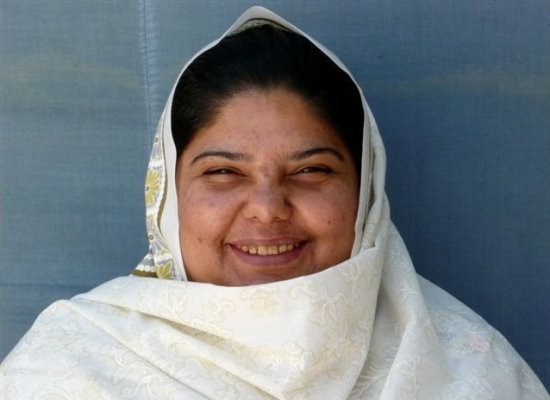
A headshot of the boisterous designer and teacher Zulekha Raisani. It’s impossible not to fall for her once you meet her. Her laughter is contagious. Photo by Caroline Brennan/Catholic Relief Services
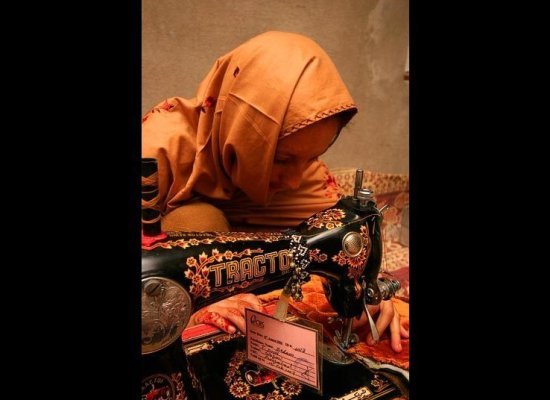
A woman masters her sewing skills. Photo by Jim Stipe/Catholic Relief Services
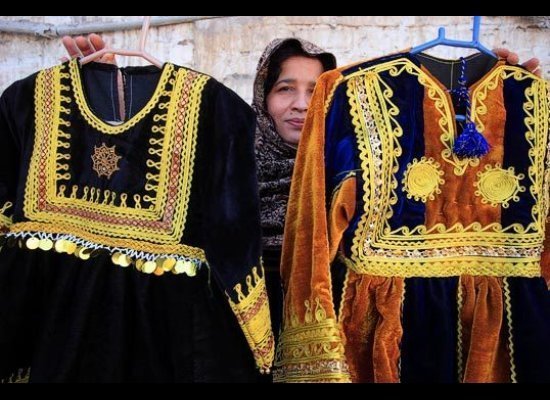
A fellow trainer shows off samples of dresses made by Afghan women. Photo by Jim Stipe/Catholic Relief Services
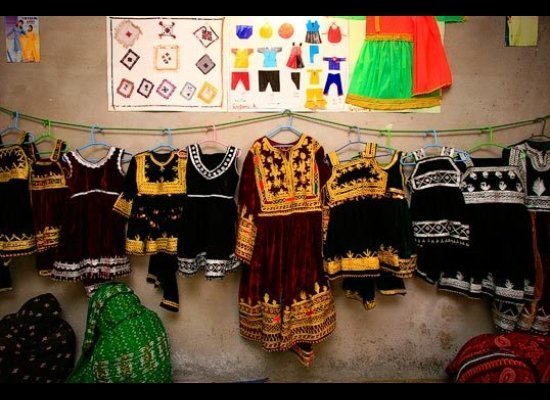
A sampling of the products made by the students.Photo by Jim Stipe/Catholic Relief Services
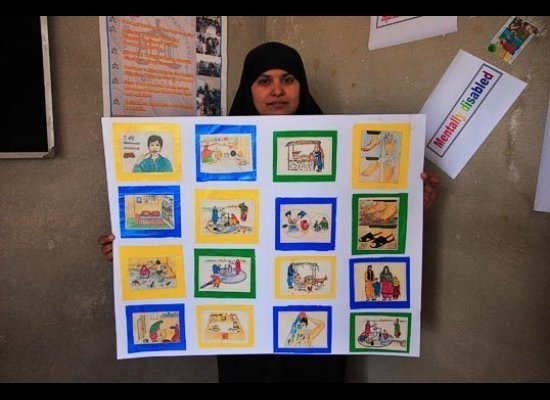
Local power point, or a teaching tool, for the Afghan refugee students. Photo by Jim Stipe/Catholic Relief Services.
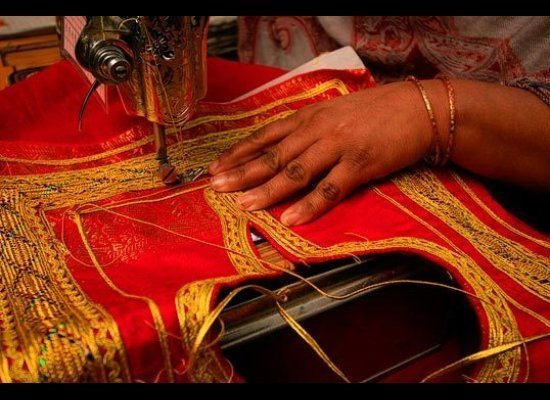
Before this class, many of the women would use a ball point pen to decorate their dresses. Photo by Jim Stipe/Catholic Relief Services.
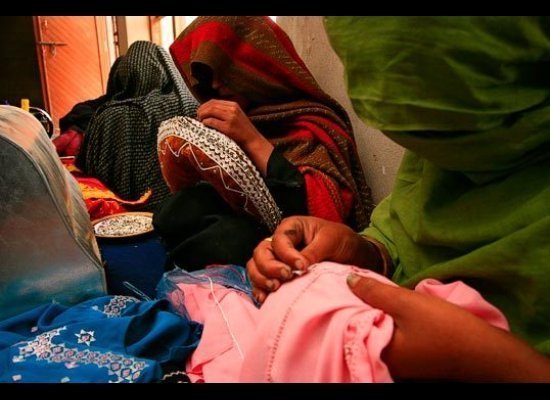
Far from being relics of a bygone era, the Afghan traditional dresses are considered exotic in the Pakistani markets. Photo by Jim Stipe/Catholic Relief Services.
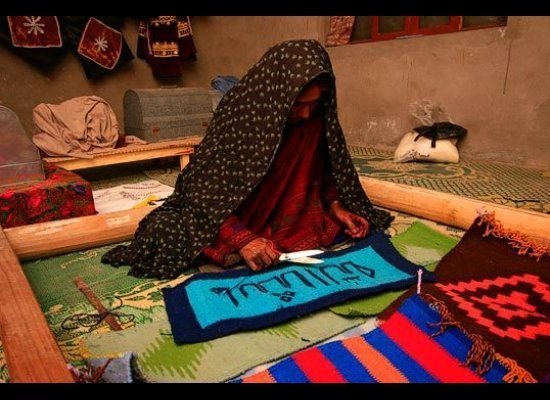
For many women in these classes, it offers their one social space to talk with other women, and non family members, about their lives and support one another.






No comments:
Post a Comment